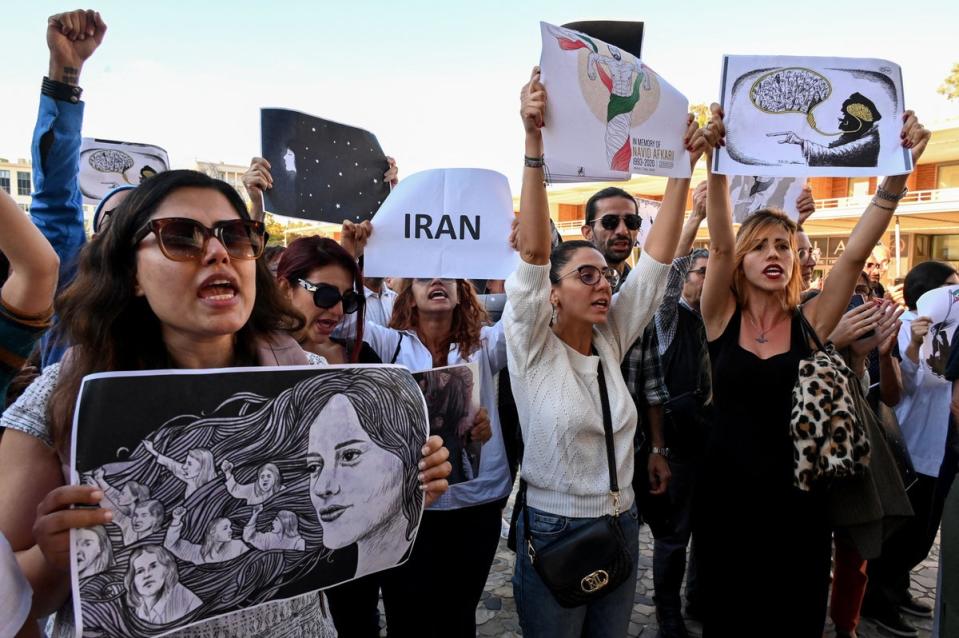Iran protests: Meta’s Oversight Board to make call on violent posts against government figures

Meta’s Oversight Board has taken on a new case regarding an Iranian protest slogan, as anti-government demonstrations continue in Iran following the death of Mahsa Amini.
The young Iranian woman died in Tehran earlier this month after being arrested and allegedly beaten by Iran’s “morality” police for donning what they deemed to be “bad hijab”. She died in custody a few days later.
Protests have taken place across the country over the past two weeks, with dozens of people reportedly injured or killed.
Now the Oversight Board, which is paid by Meta to make controversial content moderation decisions, is examining a post in which Iran’s Supreme Leader, Ayatollah Ali Khamenei, is depicted as a caricature – grabbing a woman wearing a hijab by his beard, which has been drawn as a fist.
“A text bubble in Farsi next to Ayatollah Khamenei says that being a woman is forbidden. Below the image is a caption in Farsi. This calls for death to the ‘anti-women Islamic government’ and for death to its ‘filthy leader Khamenei.’ It calls the Islamic Republic the worst dictatorship in history, in part due to restrictions on what people can wear. It calls on women in Iran not to collaborate in the oppression of women”, Meta’s Oversight Board describes.
The post, which was shared in a group with fewer than 1000 members, was reported under Meta’s hate speech rules and – after human review – Meta removed it. The user appealed the decision, but was automatically closed; they have now made an appeal to the oversight board, stating that “the post criticizes the Iran ‘dictatorship’ and human rights violations in Iran.”
Meta since said that its decision to remove the content was in error, and should have been allowed online under a “newsworthiness” allowance that rose to prominence among social media companies in the wake of former President Trump, who would often post content that would violate platforms’ terms and conditions.
Under the newsworthiness allowance, Meta allows violating content on its platforms "if keeping it visible is in the public interest."
The Oversight Board is now looking for comment from members of the public on how Meta’s newsworthiness allowance should deal with calls to violence for government and religious figures, how Meta’s moderation of anti-hijab protests is being applied, the airness of Meta’s treatment of Farsi-speaking users, and the “situation for free expression in Iran”
“Really great move”, said Mahsa Alimardani, a researcher for international human rights organization Article 19. “I hope the @OversightBoard is aware of the events happening in Iran and takes note of the fact that a lot of people with opinions needed to contribute will be busy and should extend the deadline”.
Really great move. I hope the @OversightBoard is aware of the events happening in Iran and takes note of the fact that a lot of people with opinions needed to contribute will be busy and should extend the deadline. #مهسا_امینی https://t.co/u6udqyMLUi
— mahsa alimardani 🌒 مثلا (@maasalan) October 2, 2022
The organization had previously argued that Meta’s Oversight Board in an effort to streamline processes to ensure freedom of expression is protected for users who rely on their platform in Iran last month, because “Instagram suffers from a deficit in trust and transparency when it comes to content moderation practices for the Persian community”.
Meta was previously debating similar content moderation decisions for Facebook and Instagram users in some countries calling for or violence against Russians and the death of Vladimir Putin as part of a moderation change that allowed posts promoting violence against Russian forces.
However, it later walked back that moderation decision to make it stricter. “We are now narrowing the focus to make it explicitly clear in the guidance that it is never to be interpreted as condoning violence against Russians in general,” Meta global affairs President Nick Clegg wrote in a post on the company’s internal platform on Sunday that was seen by Reuters.
“We also do not permit calls to assassinate a head of state ... So, in order to remove any ambiguity about our stance, we are further narrowing our guidance to make explicit that we are not allowing calls for the death of a head of state on our platforms.”
Meta did not respond to The Independent’s request for comment about that content moderation decision.

 Yahoo Finance
Yahoo Finance 